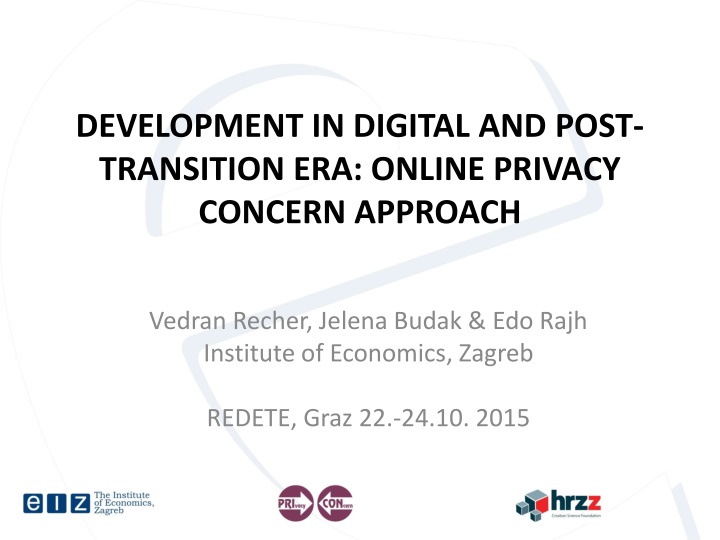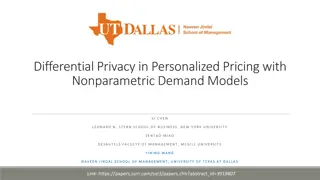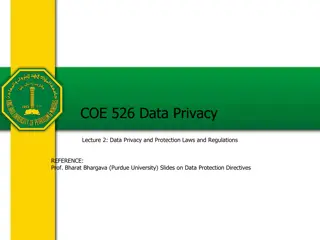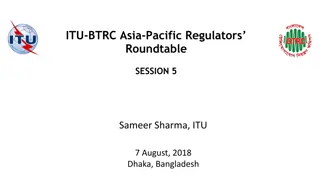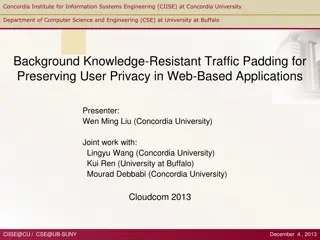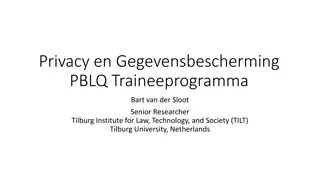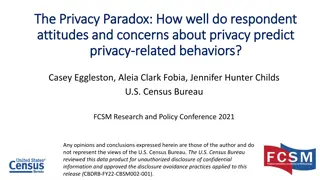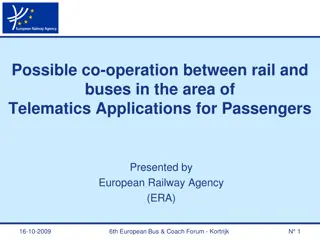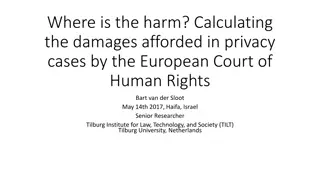Online Privacy Concern in Post-Transition Era: A Study on European Internet Users
The study explores online privacy concerns among Internet users in Europe, focusing on countries in the post-transition era such as Croatia, FYR Macedonia, Serbia, and Bosnia and Herzegovina. Findings reveal growing discomfort with online profiling and data misuse, with significant variations based on education levels and age groups. The PRICON index highlights key privacy concerns related to personal data manipulation and information misuse. Overall, the research emphasizes the critical importance of addressing online privacy issues in the digital age.
Download Presentation

Please find below an Image/Link to download the presentation.
The content on the website is provided AS IS for your information and personal use only. It may not be sold, licensed, or shared on other websites without obtaining consent from the author.If you encounter any issues during the download, it is possible that the publisher has removed the file from their server.
You are allowed to download the files provided on this website for personal or commercial use, subject to the condition that they are used lawfully. All files are the property of their respective owners.
The content on the website is provided AS IS for your information and personal use only. It may not be sold, licensed, or shared on other websites without obtaining consent from the author.
E N D
Presentation Transcript
DEVELOPMENT IN DIGITAL AND POST- TRANSITION ERA: ONLINE PRIVACY CONCERN APPROACH Vedran Recher, Jelena Budak & Edo Rajh Institute of Economics, Zagreb REDETE, Graz 22.-24.10. 2015
If this is the age of information, then privacy is the issue of our times. Acquisti, Brandimarte & Loewenstein (2015)
Introduction increasing importance of online privacy over half of Internet users in Europe feel uncomfortable with profiling on the Internet (EC, 2011) business climate, reforms, business policies determinants of OPC connection with development in post-transition?
Western Balkan countries Croatia, FYR Macedonia, Serbia, Bosnia and Herzegovina are analysed differences in the EU accession path EU regulations implemented in the course of the accession
Survey data, n=2006 % % Gender Male Country Bosnia and Herzegovina Croatia FYR of Macedonia Serbia 37.4 Internet usage 31.1 Yes No 24.9 49.7 Female Age 18-34 35-54 55-70 Education Primary school Secondary school University and higher education No answer 25.2 24.9 24.9 50.3 31.5 64.2 35.8 14.2 59.9 25.9 0.1
PRICON index Online privacy concern PRICON index 4.26 4.10 3.91 3.57 Country Croatia FYR of Macedonia Serbia Bosnia and Herzegovina 1. Information I send over the internet (e-mail, Facebook and other) could be misused. 2. The usage of computers and ICT increases the possibility of personal data manipulation. 3. I am concerned about the volume of personal information and data stored on computers that might be misused.
ANOVA results PRICON mean value Independent variable St. dev. N ANOVA Education Primary school or less F=81.40 p=0.00 0.83 285 3.43 Secondary school University education Age 18-34 35-54 55-70 Country Croatia Serbia Bosnia and Herzegovina 4.01 0.76 0.79 1201 519 and higher 4.12 F=11.85 p=0.00 4.00 4.03 3.83 0.77 0.79 0.85 632 751 623 F=76.89 p=0.00 4.26 3.91 0.69 0.81 0.86 506 500 500 3.57 FYR of Macedonia 4.10 0.69 500
Results (2) that there are no statistically significant differences in online privacy concern between males and females statistically significant differences in online privacy concern by internet usage groups
Conceptual framework Online privacy concern PRICON index Economic development Technological level achieved Institutional set-up GDP p.c. Availability of latest technologies Internet users Broadband EU status Political rights Civil liberties Country Croatia 4.26 20,182 5.4 60.3 18.3 Member state 1 2 FYR of Macedonia 4.10 11,268 4.6 51.9 12.5 Candidate country 4 3 Serbia 3.91 12,504 4.0 40.9 8.5 Candidate country 2 2 Bosnia and Herzegovina 3.57 9,149 4.4 52.0 10.4 Potential candidate 4 3
Conclusions country of origin significant antecedent of online privacy concern higher education higher OPC age reversed U-shaped curve
Conclusions (2) FYR Macedonia surprisingly high OPC technological advancements development of digital society could influence economic development in terms of GDP p.c. policies: education of general public, sound institutional framework, trust building
Thank you for your attention. The End
